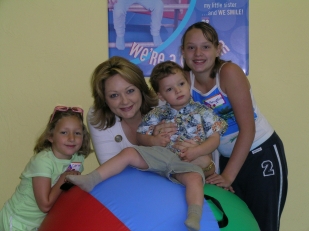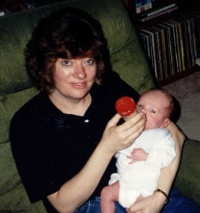Today I’d like to focus on the real faces and true stories of Perinatal Mood Disorders.
These are the stories of everyday people who have ferociously fought to survive this insidious illness.
These are the people who realize the true value of The Melanie Blocker Stokes MOTHER’S Act. They passionately support the legislation.
Many of them are also now ardently dedicated to supporting others as they tread on this dark and lonely path.
Got a few minutes?
C’mon in – grab a cup of tea and sit down.
Let me introduce you to a few of them.
Meet Heather. Her brush with Postpartum Depression began during the pregnancy of her first child. Anxiety and intrusive thoughts settled in, causing her to obsess about birth defects of her unborn infant. Things went from difficult to worse when Heather experienced a reaction to a pain medicine administered during labor. She awoke at 7 hours postpartum only to witness her son receiving oxygen. Once home, she stopped sleeping, going days without rest. Her milk supply dried up as a result of the intense stress she was experiencing. Heather and her family moved in with a family member as it was no longer safe for her to be on her own. With an intolerance to all medications (including antibiotics), she sought help via talk therapy and a kinesiologist. After a few months of therapy, she was given a clean bill of health. Heather now serves as a moderator at the Online PPD Support Page and finds helping others very rewarding and meaningful. You can read more of Heather’s story by clicking here.
Then there’s Helena Bradford, one of the most amazing women I have ever had the privilege of knowing. Her daughter Ruth Rhoden Craven tragically ended her life after struggling with Postpartum Depression. Doctors were unable to help and some bad internet advice led the family to believe all Ruth needed was a vacation. How wrong they were! Helena works each and every day with a determination to prevent what happened to Ruth from happening to others. She is deeply rooted in her faith and believes without a doubt that the Lord has used Ruth to further the cause of PPD awareness. Helena has an amazing will. She is standing strong despite her tragic loss. Read an interview with Helena by clicking here.
 Another parent who has joined the battle is Bob Gibbs. Bob lost his daughter and grandson, Jennifer Gibbs Bankston and Graham Bankston on December 19, 2007. This particular story is very hard for me to write about. I gave birth to my son on December 18, 2007, just a day before Jenny and Graham lost their lives. Even in the face of this tragedy that would cause most to buckle and falter, Bob and family have instead garnered strength and power. They have turned their loss into a powerful outreach program which has garnered national recognition. Jennyslight.org is a powerful and energetic new force within the Postpartum Advocacy landscape, one we hope will continue for a very long time. While we are saddened for their loss, we are thankful for their dedication and passion to families struggling with Postpartum Mood Disorders. Get to know Bob Gibbs in his own words by clicking here.
Another parent who has joined the battle is Bob Gibbs. Bob lost his daughter and grandson, Jennifer Gibbs Bankston and Graham Bankston on December 19, 2007. This particular story is very hard for me to write about. I gave birth to my son on December 18, 2007, just a day before Jenny and Graham lost their lives. Even in the face of this tragedy that would cause most to buckle and falter, Bob and family have instead garnered strength and power. They have turned their loss into a powerful outreach program which has garnered national recognition. Jennyslight.org is a powerful and energetic new force within the Postpartum Advocacy landscape, one we hope will continue for a very long time. While we are saddened for their loss, we are thankful for their dedication and passion to families struggling with Postpartum Mood Disorders. Get to know Bob Gibbs in his own words by clicking here.
 Meet Cheryl Jazzar. She experienced a psychotic break after the birth of her first child and was subsequently hospitalized. The break destroyed her marriage and she lost her child as a result. Five years later found her remarried with another child on the way. She experienced a depression a few months after birth. Using self-care, she rebounded quickly and knew she had something to share. Cheryl began to educate herself regarding alternative and complementary methods of treatments available to mothers during the perinatal period. She quickly became quite knowledgeable regarding non-traditional methods of treatment with a strong desire to share this with other mothers. Cheryl is a passionately dedicated volunteer for PSI and also blogs at Wellpostpartum regarding alternative and compassionate care. You can read Chery’s interview here.
Meet Cheryl Jazzar. She experienced a psychotic break after the birth of her first child and was subsequently hospitalized. The break destroyed her marriage and she lost her child as a result. Five years later found her remarried with another child on the way. She experienced a depression a few months after birth. Using self-care, she rebounded quickly and knew she had something to share. Cheryl began to educate herself regarding alternative and complementary methods of treatments available to mothers during the perinatal period. She quickly became quite knowledgeable regarding non-traditional methods of treatment with a strong desire to share this with other mothers. Cheryl is a passionately dedicated volunteer for PSI and also blogs at Wellpostpartum regarding alternative and compassionate care. You can read Chery’s interview here.
 Now I’d like to provide a different point of view. A mom is not the only one affected by a Postpartum Mood Disorder. Her husband is also affected. Meet Dan Scott, a father who has stood by his wife as she struggled three times with a Postpartum Mood Disorder. Each time was a unique experience, one that tested their marriage and their faith. Dan states that the second time around was the worst – there are moments they don’t even remember because the circumstances were so dark. As a result of his journey, he finds himself more sensitive towards new mothers. He recognizes the hard times the birth of a child can bring. He advocates for new fathers to step up and take their vow of “for better or for worse” seriously. Dan believes he is a better man for having been through this with his wife. Want to read more about Dan’s story in his words? Click here.
Now I’d like to provide a different point of view. A mom is not the only one affected by a Postpartum Mood Disorder. Her husband is also affected. Meet Dan Scott, a father who has stood by his wife as she struggled three times with a Postpartum Mood Disorder. Each time was a unique experience, one that tested their marriage and their faith. Dan states that the second time around was the worst – there are moments they don’t even remember because the circumstances were so dark. As a result of his journey, he finds himself more sensitive towards new mothers. He recognizes the hard times the birth of a child can bring. He advocates for new fathers to step up and take their vow of “for better or for worse” seriously. Dan believes he is a better man for having been through this with his wife. Want to read more about Dan’s story in his words? Click here.
Last but not least, I’d really like to introduce you to a mom named Jamie. She’s a mother to one daughter and is due to give birth in June. Is she scared of experiencing Postpartum Depression again? Absolutely. Has she had issues with mood already during pregnancy? Yeap. But she is bravely speaking up about her experience and is being very pro-active this time around. Her first episode found her not wanting to bond with her child. Instead of being the blissful new mom society tells we should be, Jamie cried, lashed out, and wanted to pack her bags to run away. She finally sought help after her father questioned her constant negativity. Jamie has one piece of advice for new moms. Get help – the sooner the better. Want to read more about Jamie’s story in her own words? Click here.
Now that you’ve had a chance to read some of the true stories of survival, I hope you’re picking up your phone and calling the H.E.L.P. Committee.(If the line is busy, call the next member but keep trying until you’ve spoken with every office!)
Have you emailed Susan Stone yet with permission to be added to a list of supporters? If not, email her with your name, state, and any credentials or organizational affiliations at susanstonelcsw@aol.com right now! (Seriously – you’re already on your computer, right? It takes five seconds!)
I hope you’re blogging to raise awareness and support for The Melanie Blocker Stokes MOTHER’S Act. Got a twitter account? Raise your voice there too. Share this on Facebook! DIGG it! Don’t let these voices go to waste. Raise yours with them.
Remember in the children’s book, Horton Hears a Who, it wasn’t until the tiniest Who raised his voice that the jungle animals finally believed in the existence of the Whos. We need ALL of your voices. Now.

